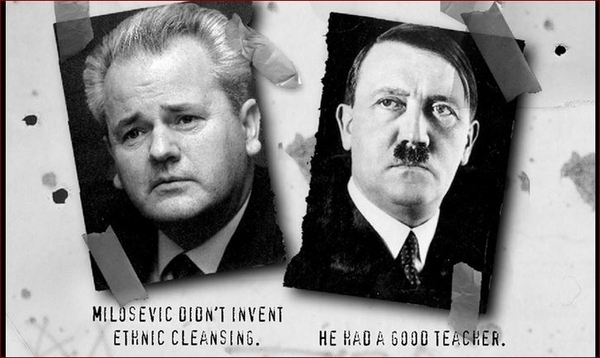 If Germany had been offered the same terms that President Clinton is offering Serbia, the Nazi Party would have remained in power in Berlin and territory captured by the Wehrmacht would have remained part of the Third Reich. |
LIKE SO much else that Bill Clinton has had a hand in, the Kosovo peace plan is a shabby betrayal.
Throughout this conflict, Clinton has used analogies to Germany and World War II to justify the NATO operation. It was not an unfair comparison, despite the vast difference in scale. True, the Serbs were not embarked on continental conquest or exterminating men, women, and children in gas chambers. But like the Nazis, they had pitilessly deployed terror and violence against a minority in their midst. What they called "ethnic cleansing" had left thousands dead and hundreds of thousands homeless. Not since Hitler's time had Europe witnessed such brutality: women rounded up to be raped by Serb soldiers, whole communities emptied at gunpoint, villages in flames, mass graves.
So let us contemplate what peace with Germany would have looked like if it had been organized along the lines now on offer in Kosovo.
There would have been no German surrender. Instead, the Allies would have negotiated an armistice with the German high command in Berlin, whereby the Wehrmacht would pull out of the lands it had overrun and an international force would move in to ensure the safety of the locals and enable refugees to return. Some of these peacekeepers would have come from America and its Allies; others would have been drawn from nations, friendly to Germany, that had supported the Nazis during the war — Austrians, Turks, perhaps Ukrainians.
Even after its troops withdrew, Germany would have retained sovereignty over the territory it had annexed. Sudeten Czechs and Gdansk Poles who had fled when the Nazis moved in would be allowed to return, but on the understanding that they were returning to the Third Reich.
In Berlin, the Nazi Party would have remained in control. There would have been no de-Nazification, no war crimes trials. The Allies would not have occupied Germany, let alone compelled it to become a democracy. Generously, however, Americans would have paid to repair and rebuild German cities damaged by US bombs; indeed President Roosevelt would have vowed to do so even as the bombs were falling. By contrast, the question of reparations for the Nazis' victims would have been left open. Certainly peace would not have depended on any Nazi promise to make whole those who survived their savagery.
Hitler, of course, would have stayed on as fuehrer. Destroying his regime would never have been the Allies' aim, and they would have had no qualms about negotiating with him. Critics would have howled that leaving Hitler in power was unforgivable, a blunder of staggering proportions. But FDR's spin machine would have gone into overdrive, and the deal with Hitler would have been hailed as a victory.
Just like the deal with Milosevic.
The Butcher of Belgrade, the cause of Europe's worst bloodletting in 50 years, should have been put on notice from the outset that the United States and its NATO allies intended to capture him, prosecute him for his crimes against humanity, and hang him and his henchmen from a gallows. Not only would that have achieved a measure of justice, it would have sent an unignorable warning to the planet's other would-be Milosevices.
All contact with Milosevic should have ceased when the War Crimes Tribunal indicted him. To continue negotiating with such a villain, to treat him as a legitimate leader with whom a settlement could be reached, was shameful, an abdication of moral leadership.
NATO's "victory" over the Serbs should seem familiar, for we have seen such triumphs before. Just ask Saddam Hussein. Military defeat and repeated attacks from the air have not weakened his grip on power. His drive to stock an arsenal with nuclear, chemical, and biological weapons has not slowed. He remains a deadly menace, and only an ongoing Western presence in Iraq's airspace keeps him from resuming his war against the Kurdish minority within his borders.
The extent of our betrayal of the Kosovars will become clear in the weeks ahead. Already, though, their losses far outweigh Milosevic's.
The Rambouillet accord, which NATO went to war to enforce, guaranteed the Kosovars more than autonomy. It promised them a plebiscite on independence in 2002. That promise is now worthless; there is no hint of a plebiscite in the peace terms that Milosevic has accepted, and you will not hear the word "Rambouillet" escape NATO lips.
The Serb troops who terrorized the Kosovars are not required to disarm under the armistice agreement. The "demilitarization of the Kosovo Liberation Army," however, is explicitly mandated. Clearly the KLA will not turn its weapons over to the Yugoslav Army. Which means it will fall to the international peacekeepers, the supposed guarantors of the Kosovars' safety, to take away the Kosovars' weapons.
The Yugoslav war, fought so as to minimize NATO's casualties, maximized the suffering of the people it was meant to help. It failed to accomplish its foremost goal — halting the violence in Kosovo and blocking the Serbs from widening their expulsions. This "peace," too, will not live up to its billing. For it is a peace that resembles the president who will embrace it. Both are without honor.
(Jeff Jacoby is a columnist for The Boston Globe).
-- ## --
Follow Jeff Jacoby on X (aka Twitter).
Discuss his columns on Facebook.
Want to read more? Sign up for "Arguable," Jeff Jacoby's free weekly email newsletter.

